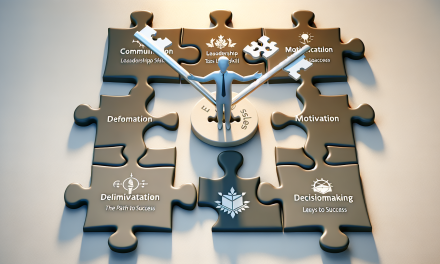Table of Contents
- Introduction
- The Importance of Planning, Organizing, and Delegating
- Strategies for Successful Planning
- Mastering the Art of Organizing
- Effective Delegation Techniques
- Enhancing Communication Skills
- Overcoming Common Challenges
- FAQs
- Conclusion
Introduction
Are you looking to enhance your skills in planning, organization, and delegation? If so, you are in the right place! In today’s fast-paced environment, mastering these essential skills can significantly boost your efficiency and productivity. By actively engaging in strategic planning, effective organization, and successful delegation, you can empower yourself and your team members to achieve remarkable results.
The Importance of Planning, Organizing, and Delegating
Firstly, let’s discuss the significance of these three pillars. Planning lays the foundation for any successful project, ensuring that all team members understand their tasks and objectives. Furthermore, organizing effectively allows teams to allocate resources optimally, ultimately leading to greater productivity. Finally, delegation encourages collaboration and growth, as team members take ownership of their responsibilities and develop their skills.
Why Focus on These Skills?
In any working environment, be it a small startup or a large corporation, the blend of planning, organizing, and delegating can make a tremendous difference in achieving goals. Moreover, these skills do not just benefit individual professionals; they also enhance team dynamics and overall workplace satisfaction. If you are eager to cultivate these essential skills, consider exploring the Effective Delegation & Organizing Skills Training Course for a more structured approach.
Strategies for Successful Planning
Effective planning involves a clear set of strategies that guide your decision-making process. Thus, the following techniques will help you plan successfully and strategically:
Set Clear Goals
Utilizing the SMART criteria is a proven method to set goals that are Specific, Measurable, Achievable, Relevant, and Time-bound. Consequently, clear goals help you focus on priorities, eliminating confusion and ensuring everyone is on the same page.
Create Action Plans
Action plans lay out the steps necessary to achieve the goals you have set. To create an effective action plan, list your tasks, assign deadlines, and identify the individuals responsible for completing each task.
Evaluate and Adjust
Continuous monitoring and evaluating your plans allow you to make necessary adjustments in response to unforeseen circumstances. Therefore, drawing on regular reviews helps you stay on track and meet your objectives.
Mastering the Art of Organizing
After establishing a solid plan, the next step is to organize effectively. Here’s how to enhance your organizational skills:
Organize Your Workspace
Firstly, a tidy workspace promotes efficiency. Take some time to declutter your physical and digital environments, as an organized workspace helps reduce distractions and fosters productivity.
Prioritize Tasks
Sorting tasks by importance allows you to tackle vital activities first. Use tools such as the Eisenhower Matrix to distinguish between what is urgent and important, ensuring you allocate your time appropriately.
Utilize Technology
Technology offers a wealth of tools to assist in organization. Project management software, calendar applications, and collaboration platforms can streamline workflows and improve communication.
Effective Delegation Techniques
Delegation plays a crucial role in enhancing productivity and developing team members’ skills. Here are effective techniques to foster successful delegation:
Understand Your Team’s Strengths
To delegate successfully, it is important to know the strengths and weaknesses of your team. Leverage each member’s expertise for optimal efficiency while carving a path for their personal growth.
Provide Clear Instructions
When delegating tasks, provide clear and concise instructions. Use examples when possible, and encourage team members to ask questions for clarity. This practice helps eliminate ambiguity and sets everyone up for success.
Trust Your Team
One of the greatest challenges in delegation is overcoming the instinct to micromanage. Rely on your team members to complete their tasks independently, and offer support when needed. Trust fosters confidence and encourages accountability.
Enhancing Communication Skills
Effective communication is vital in all aspects of planning, organizing, and delegating. Here are tips to refine your communication skills:
Practice Active Listening
Active listening involves truly hearing and understanding what is being communicated. Practice this by giving your full attention, maintaining eye contact, and providing feedback. This skill builds rapport and enhances teamwork.
Encourage Open Dialogue
Protect a culture of open dialogue within your organization by encouraging team members to voice their ideas and concerns without fear. This practice not only cultivates innovation but also strengthens relationships.
Utilize Non-Verbal Communication
Non-verbal cues, such as body language and tone, play a significant role in communication. Be mindful of your non-verbal signals to avoid misinterpretation and reinforce your messages effectively.
Overcoming Common Challenges
Even the most skilled planners and organizers face challenges. Here are some common hurdles along with strategies to overcome them:
Time Management Struggles
Feeling overwhelmed by a packed schedule can hinder effective planning and organization. Combat this by prioritizing tasks and using scheduling tools that help you allocate time wisely.
Lack of Team Motivation
If your team lacks motivation, it can jeopardize planning and delegation efforts. Encourage a positive atmosphere, provide recognition for achievements, and involve your team in decision-making processes.
Resistance to Change
People naturally resist change, making it difficult to implement new plans. To ease this concern, communicate the benefits of changes clearly, and ensure that your team feels supported throughout the transition.
FAQs
1. What are the basic principles of effective planning?
Effective planning relies on having clear goals, creating actionable steps, regularly evaluating progress, and remaining flexible to make adjustments as needed.
2. How can I improve my organizational skills?
Improving organizational skills can be achieved through decluttering your workspace, prioritizing tasks, and leveraging technology for better workflow management.
3. What are the benefits of delegation?
Delegation allows for the distribution of tasks, empowering team members, improving productivity, and enhancing overall team performance.
4. How do I overcome a lack of motivation in my team?
To tackle motivation issues, encourage a positive work environment, recognize individual and team achievements, and involve team members in decisions that affect their work.
5. Can communication skills be developed?
Yes! Communication skills can be enhanced through practice, feedback, and active involvement in discussions and group settings.
Conclusion
In conclusion, mastering the essential skills of planning, organizing, and delegating can dramatically alter your professional journey. Implementing the strategies outlined in this post will not only enhance your individual effectiveness but also contribute to a cohesive, motivated, and productive team. By embracing the principles of effective planning and organizing, coupled with strong delegation techniques, you lay the groundwork for success in the ever-evolving workplace. For a deeper understanding of these skills, consider reading more on the art of planning, organizing, and delegating in Mastering the Art of Planning, Organizing, and Delegating. Additionally, explore resources like Mastering Communication, Coordination, and Leadership Skills, Unlocking Leadership Potential: Excellence with Humility, Unlocking Leadership Potential through Dynamic Decision Making, and Mastering Management and Leadership for Success. Happy planning!





